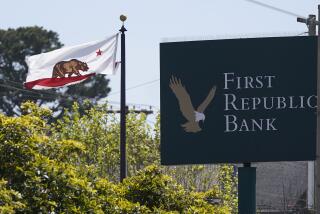Some Large Banks Should Not Be Saved--Greenspan : Reform: Federal Reserve chairman cites injustice of the ‘too-big-to- fail’ policy and expects it to spark political debate.
- Share via
CHICAGO — Federal Reserve Chairman Alan Greenspan on Thursday sharply criticized a practice of rescuing large troubled banks while letting smaller ones fail.
In remarks at a conference on bank reform sponsored by the Chicago Federal Reserve, Greenspan said he could see circumstances in which big banks could fail and not pose a grave risk to the economy.
“I would not even argue that all large banks are too big to fail,” the central bank chief said during a question-and-answer session that followed a speech he delivered to bank officials from across the country.
“I can conceive of innumerable cases where a large banking institution, in very serious trouble, moving toward Chapter 11, should be liquidated,” Greenspan said.
The policy of saving large banks evolved from the 1984 rescue of Continental Illinois Bank in Chicago. Most recently, federal banking regulators came under harsh criticism for rescuing Boston-based Bank of New England after closing Freedom National Bank in Harlem, a smaller bank that served a minority community.
“The doctrine, as such, has implemented or perceived a great deal of injustice, and none of us likes it,” he said.
As a comparison, Greenspan cited the failure of junk bond specialists Drexel Burnham Lambert Inc., saying the demise of such a prominent brokerage did not cause irreparable harm to the economy.
Greenspan said the too-big-to-fail policy “is going to be the most significant political issue” as Congress debates a bill to modernize the nation’s banks.
He said the banking industry’s reliance on federal deposit insurance and other safety nets “has swung too far.” Banks that make risky loans based on the cost savings offered by those safety nets--loans they otherwise wouldn’t make in a free market--are running the risk of failure, he said.
He predicted that the massive losses from the savings and loan crisis and rapid depletion of the government’s bank insurance fund will lead Congress to limit bank protection.
He urged bankers to embark on a safer course by whittling down debt and building up capital reserves. The credit crunch, the dramatic slowdown in business lending, “has many of its roots in the credit excesses of the 1980s,” Greenspan said.
On the credit crunch, Greenspan said that despite a steady drop in interest rates since last summer, bank lending has risen only slightly in recent weeks and even that trend is difficult to verify.
The Fed has blamed tight bank lending policies as a major cause of the recession.
Hurt by loans to real estate developers and Third World countries that are behind in their payments, banks have been hesitant to make new loans.
The slowdown in lending by banks also was related to the recession and uncertainties associated with the Gulf War, Greenspan told the conference.
More to Read
Get the L.A. Times Politics newsletter
Deeply reported insights into legislation, politics and policy from Sacramento, Washington and beyond. In your inbox twice per week.
You may occasionally receive promotional content from the Los Angeles Times.










